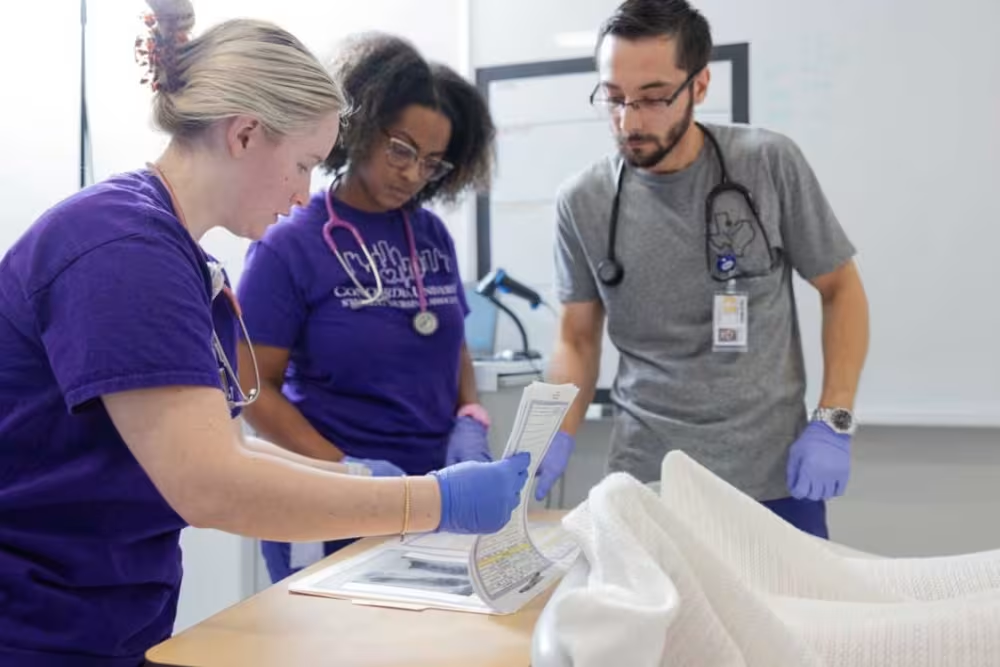11 Pros and Cons of Nursing
Each blog post is dated and contains accurate information as of that date. Certain information may have changed since the blog post publication date. If you would like to confirm the current accuracy of blog information, please visit our ABSN overview page or contact admissions at (866) 891-1371.
Before deciding whether a nursing career is right for you, consider the pros and cons of nursing. Some of the benefits of being a nurse include a strong job growth rate, considerable earning potential, a diverse range of nursing specialties, and advancement opportunities. Drawbacks include stress and disease exposure.

All vocations have both positive and negative aspects. If you’re thinking about switching careers, the key to happiness at work is finding a career in which the positives outweigh the negatives.
Before applying to a nursing program, consider weighing the pros and cons of nursing. Then, you can decide if the benefits outweigh the potential drawbacks.
If you decide nursing is the right career for you and you have a non-nursing bachelor’s degree or college credits, an accelerated nursing program can help you earn a degree fast. At Concordia University Texas, the Accelerated Bachelor of Science in Nursing (ABSN) track can leverage your prior non-nursing college education toward earning a Bachelor of Science in Nursing (BSN) in as few as 16 months.

Explore the process of becoming a nurse with a non-nursing bachelor’s degree.
When considering the pros and cons of being a nurse, think about factors like earning potential, job growth, advancement opportunities, and work settings. You should also consider potential drawbacks, such as exposure to disease, but be aware that there are mitigating factors that effectively address these drawbacks.
Benefits of Being a Nurse
Many nursing students decide to join the field for altruistic purposes, but there are plenty of other benefits of being a nurse to consider, such as the room for growth and diverse specialization opportunities.
1. Nurses Have Strong Earning Potential
A nurse’s salary depends on many factors, such as their healthcare employer, geographic location, years of experience, nursing specialty, certifications, and so on.
In general, nurses can expect a considerable earning potential with room for growth. According to the U.S. Bureau of Labor Statistics (BLS), registered nurses made a median annual salary of $93,600 as of May 2024.
If you decide to pursue advancement opportunities, you can expect a bump in salary. The BLS states that most types of Advanced Practice Registered Nurses (APRNs) made a median annual salary of $132,050 as of May 2024. Certified registered nurse anesthetists made even more, with a median annual salary of $223,210 as of that date.

2. Nursing Is a High-Growth Field
Another benefit of becoming a nurse is the job growth. According to the BLS, there is an ongoing shortage of RNs in the U.S., partly due to the increased need for nurses to care for the aging population.
The BLS states that the job growth rate for RNs is expected to be 6% from 2023 through 2033, faster than average, indicating that healthcare employers will hire about 197,200 new nurses during this period.
The job growth rate is even higher for most types of APRNs. The BLS projects that the job growth rate for nurse anesthetists, nurse midwives, and nurse practitioners will be 40% from 2023 through 2033, much faster than average. At this rate, there will be a need for about 141,200 new APRNs during this time.
3. Nurses Can Choose From Many Different Specialties
Choosing a nursing specialty can be an exciting process. During clinical rotations, you’ll have opportunities to work in various nursing units, such as pediatrics and obstetrics. After passing the NCLEX-RN and earning your license, you might choose a nursing specialty, such as:
- Behavioral health
- Cardiac
- Critical care
- Dialysis
- Emergency room
- Neonatal
- Primary care
4. Nursing Encompasses a Wide Variety of Work Settings
Another benefit of being a nurse is the opportunity to choose from many clinical settings. Nurses often work in hospitals, but they can also work in:
- Disaster zones as a disaster response nurse
- Emergency medical evacuation flights
- Home health agencies
- Hospice agencies
- Outpatient facilities
- Public health agencies
- Schools
- Urgent care centers

5. Nurses Have Considerable Advancement Potential
After gaining some clinical experience in your specialty, you might decide to return to school for a graduate degree in nursing. If so, you could earn board certification in your specialty area and become an APRN. There are four main types of APRNs:
- Certified registered nurse anesthetist
- Clinical nurse specialist
- Nurse practitioner
- Certified nurse midwife
APRNs serve as leaders, advocates, and mentors in the nursing field. They may work toward improving nursing practice, such as tweaking organizational processes to deliver better care to patients.
6. Nurses Can Choose a Career Away From the Bedside
At some point, you might decide to step away from patient care. If you prefer a career away from the bedside, you might consider becoming a:
- Nurse administrator
- Nurse consultant
- Nurse informaticist
- Nurse manager
- Legal nurse consultant
- Nurse researcher

7. Nurses Can Enjoy Opportunities for Travel
If you’re an adventurous person and would love to travel frequently, consider becoming a travel nurse.
A travel nurse works for one or more travel nursing agencies, which connect nurses to short-term work opportunities at facilities around the country. A travel nurse can choose which assignments to apply for, then spend several months or more working at these temporary jobs.
Travel nursing allows you to explore different regions of the country far more thoroughly than you could on a vacation. Plus, you could take time off between assignments if you wish. It’s a highly flexible lifestyle.
8. Some Nurses Have a Three-Day Work Week
Many nurses work a three-day work week. They put in three days of 12-hour shifts and then enjoy four full days off. This can be an ideal schedule for those raising a family, as it allows for four full days to spend with the kids.
If a more traditional 9-to-5 schedule appeals to you, however, there are plenty of nursing jobs that come with regular hours, as well. For example, you might decide to become a school nurse.
Getting ready to head off to nursing school? Learn how to prepare for success.

Cons of Nursing
Although there are many benefits of pursuing a nursing career, there can also be some potential disadvantages. Considering both the pros and cons of nursing can offer a more balanced view of the career field.
9. Potential Exposure to Diseases
One drawback is that nurses can be exposed to various diseases due to contact with sick patients. This is why hospitals require nurses to follow strict protocols for infection control.
These protocols protect both patients and healthcare workers. For example, frequent handwashing, the use of hand sanitizer, and mask-wearing, along with other personal protective equipment (PPE), help mitigate the risk of exposure to germs.
10. Not All Patients Will Survive
Nurses generally enter the field because they want to help other people, yet not every patient will survive. This can be emotionally draining and stressful.
It’s important for nurses to cultivate emotional resilience and practice self-care. While work-life balance is important, it can be equally important to leave one’s work at the job site. That is, try not to be overly preoccupied with thoughts of your patients while you’re at home or out with friends.
While nursing can be emotionally demanding, requiring you to be resilient, the positive patient outcomes and relationships help make the challenges worth it. Nurses develop strong support systems, both inside and outside the workplace, so they can continue to show up for their patients each day.
11. Nursing Can Be Physically Demanding
Of the pros and cons of being a nurse, another potential con is that nursing can be physically demanding. Some nurses work long shifts and spend long hours on their feet. They must also lift and reposition patients.
The good news is that an active career can support your overall wellness. In addition, comfortable shoes and the use of hospital lifting equipment can lessen the physical demands. Furthermore, you could choose a nursing specialty that doesn’t require long hours on your feet. Instead of becoming a medical-surgical nurse, for example, consider becoming a public health nurse.

Experience the Benefits of Nursing for Yourself
After weighing the pros and cons of nursing, it’s time to decide if you’re ready to move forward. If so, Concordia University Texas is here to support you. Our faith-based school offers an accelerated nursing track that allows you to graduate in as few as 16 months upon completion of the prerequisites.
Contact an admissions counselor today to learn whether our ABSN track in Austin and Dallas-Fort Worth could be right for you.
